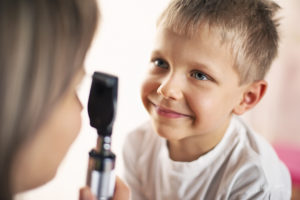August is National Children’s Eye Health and Safety Month
- Posted on: Aug 15 2018

Children’s eye health is critical to their performance in school. Children with refractive errors such as nearsightedness or farsightedness may struggle to either read their textbooks and write out their homework or to see demonstrations their teacher writes on the board at the front of the classroom. During a routine exam, your child’s eye doctor can detect signs of visual disturbances caused by refractive errors, as well as:
- Color blindness
- Ptosis, or eyelid drooping.
- Amblyopia, or lazy eye.
- Strabismus, or crossed-eyes.
Your Child Will Give You Clues to Eye Problems
The best way to detect eye problems is through routine eye exams. Waiting for visible signs that your child does not see as well as needed could mean unnecessary struggles with schoolwork and other aspects of life. If your family has a history of childhood vision problems, or if your child exhibits any of the following behaviors, it would be beneficial to schedule an eye exam right away:
- It appears as though your child’s eyes are crossed or that they “wander.”
- When watching television, your child frequently tilts her head.
- Reading, coloring, and other up-close tasks do not interest your child, or they frustrate him.
- Your child has difficulty observing objects in the distance.
August isn’t just a month to observe children’s vision, but also their eye safety. As we begin another school year filled with sports and extracurricular activities, we must also turn our attention to the necessity of protective eyewear. Any child who plays sports should wear glasses or headgear that protect their eyes from flying objects and other players. Teams usually supply such gear; it is up to parents to ensure their child wears it.
Routine eye exams are a convenient way to support your child’s success at school. Schedule your child’s visit with us at 908.879.7297.
Posted in: Eye Exam, Pediatric Eye Care


